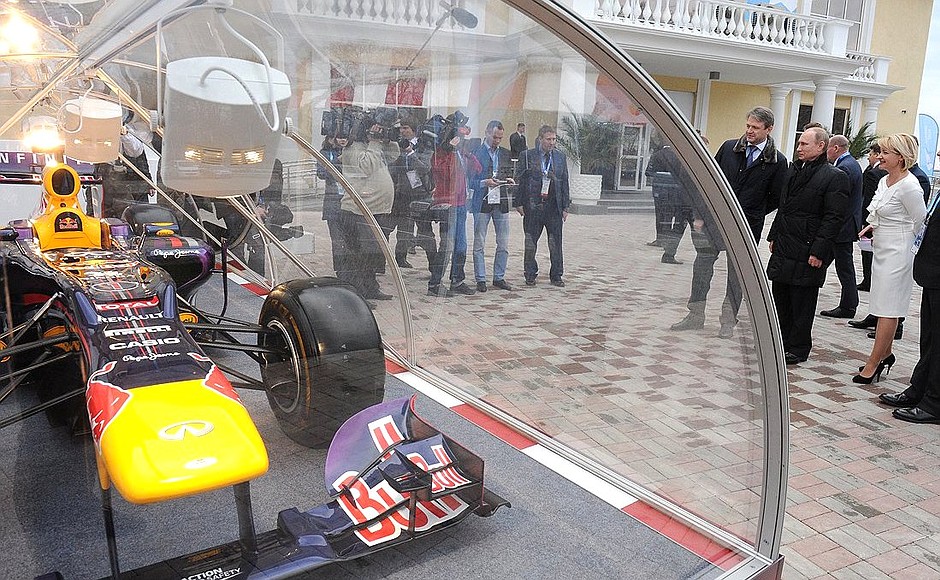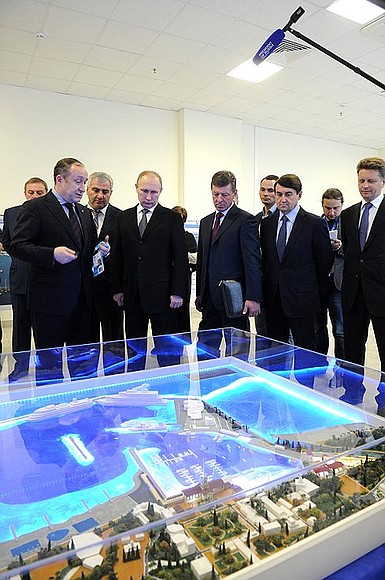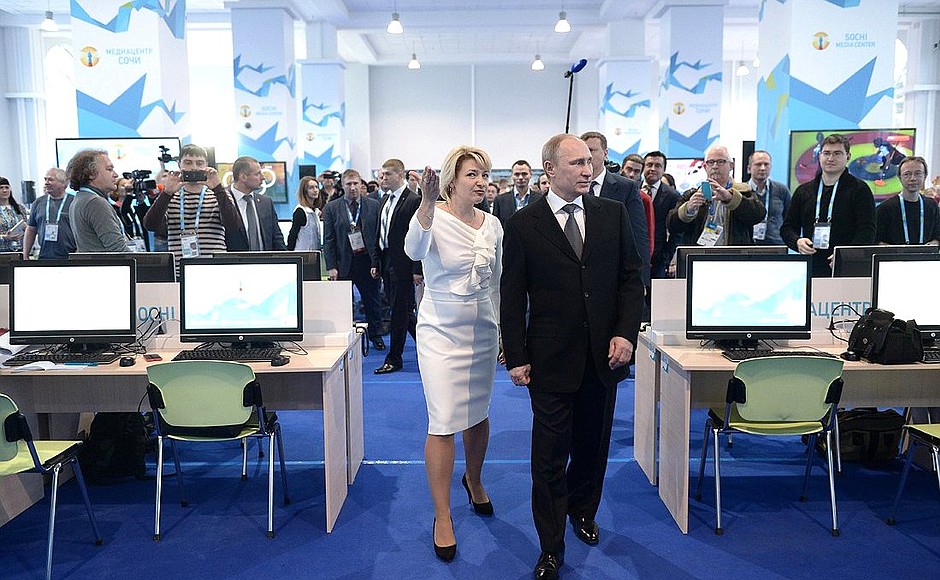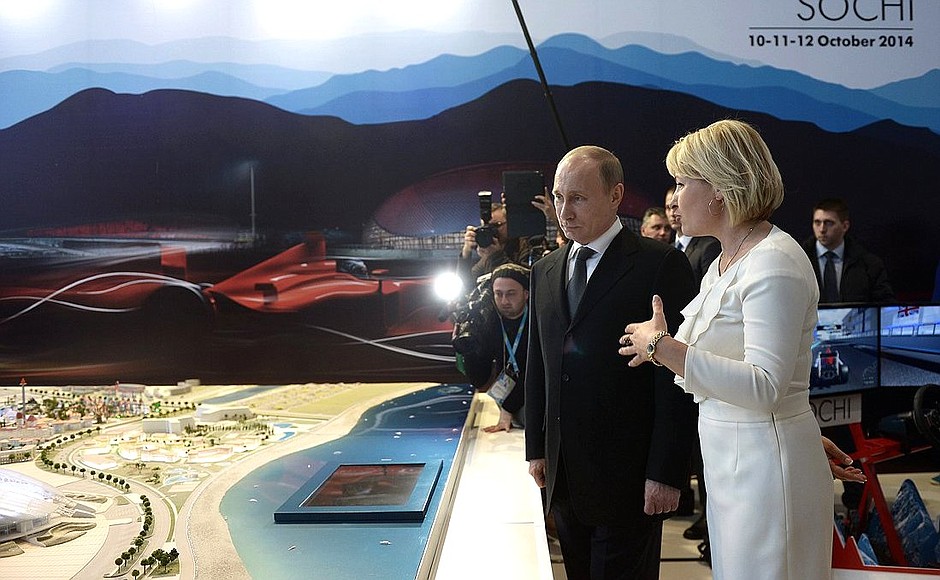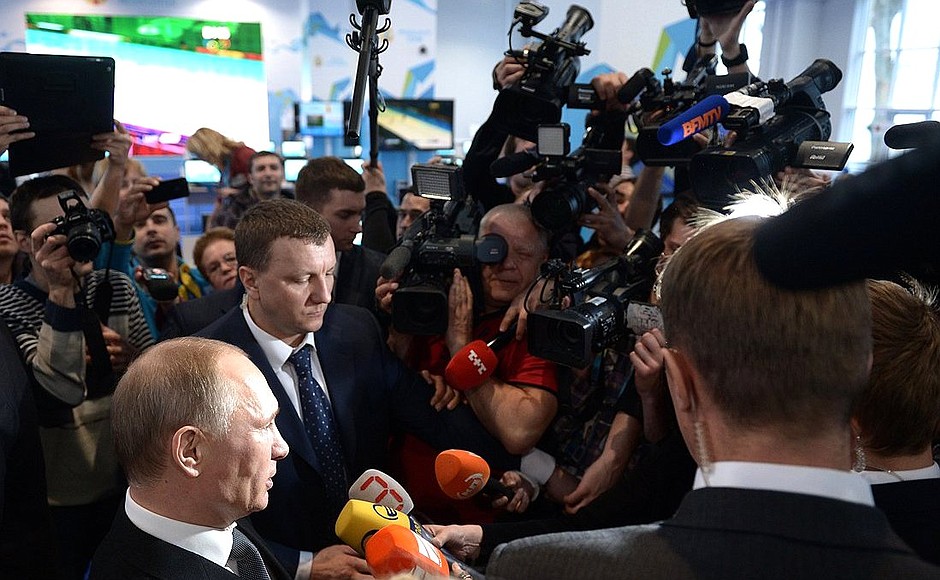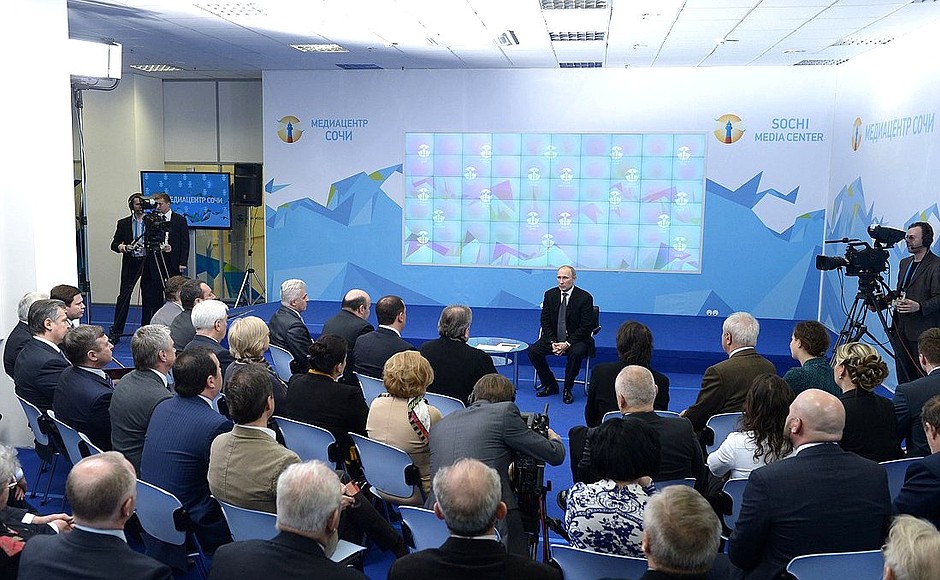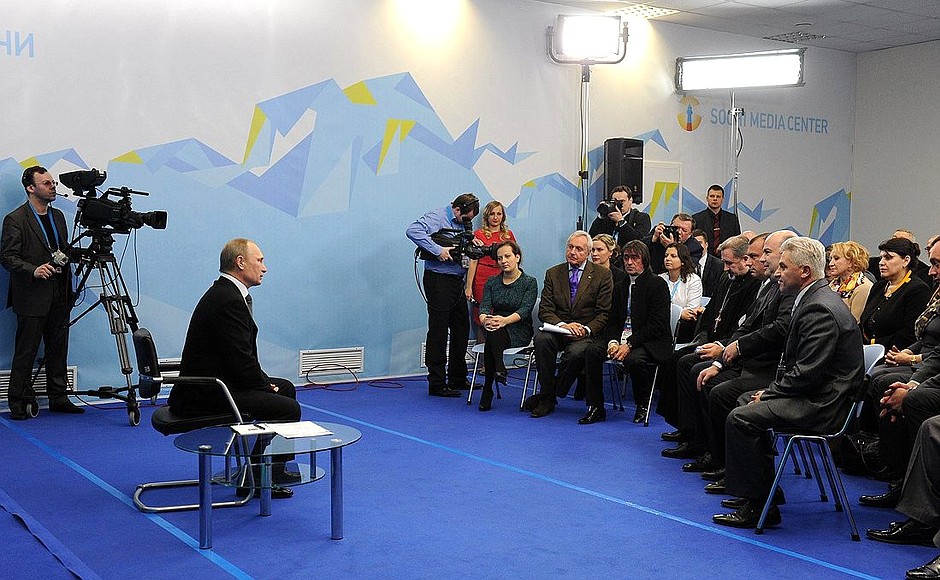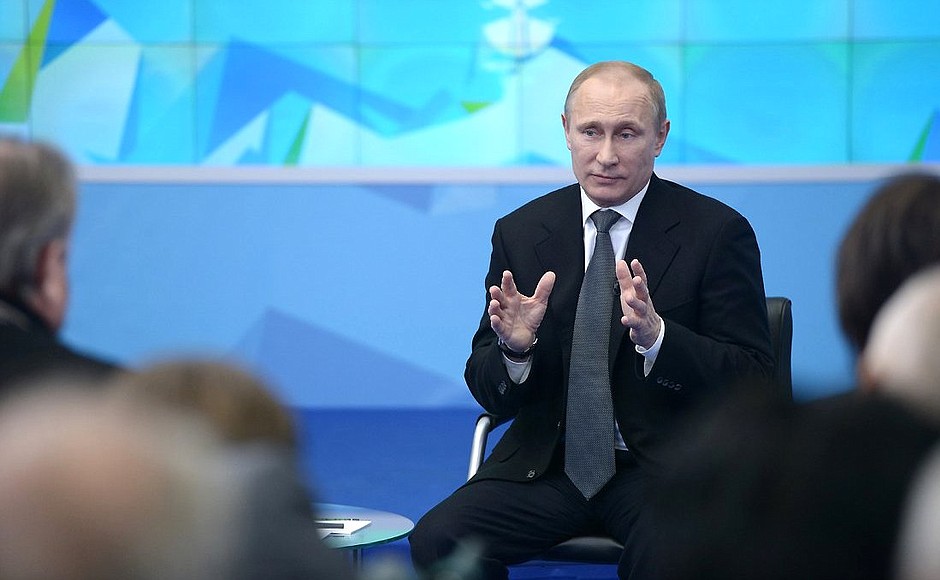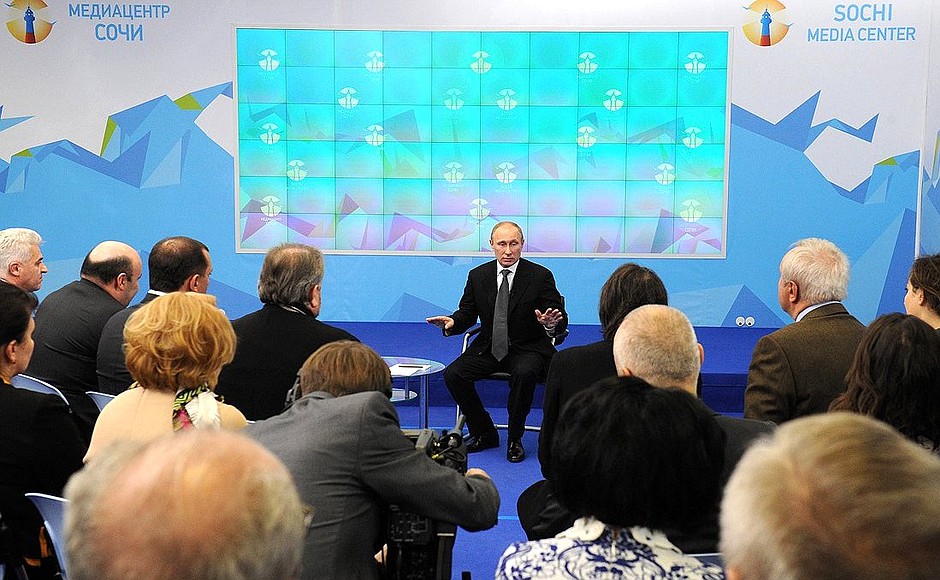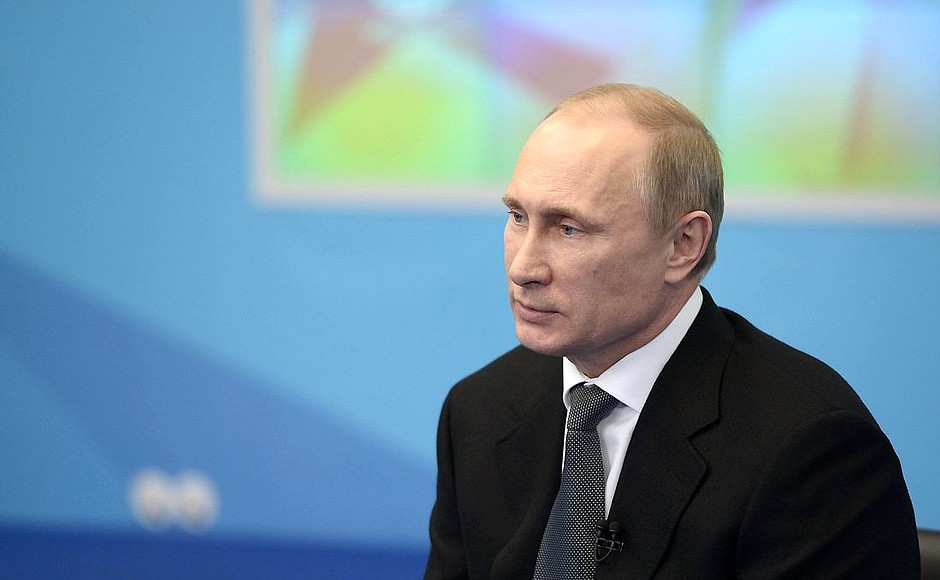See also
The meeting was held at the Sochi Media Centre, which was opened for journalists not accredited at the Olympic Games. At the Centre, journalists can get all the latest news about the competitions and talk with athletes and visitors to the Olympics.
Before the meeting with the Public Council began, Vladimir Putin visited the Media Centre’s working area. Transport Minister Maxim Sokolov, who was accompanying the President, reported on infrastructure modernisation at the Sochi seaport (where the Media Centre is located) and the construction of a sea and cruise passenger terminal. The President also saw a model of a Formula 1 race track, which is expected to start hosting competitions as from October this year.
* * *
Excerpts from transcript of meeting with representatives of Public Council for the Preparation of the 2014 Winter Olympic Games
President of Russia Vladimir Putin: Good afternoon, friends,
I could call you colleagues really too, since we worked together on the Sochi project. I say that we worked together because I know from the reports from my aides and staff that after the Public Council was established it was in direct communication with the builders and the Games’ organisers and in one way or another influenced what was happening in the city as far as the residents’ interests were concerned.
I know that the residents have had to bear a burden during all of this work, and I thank them for bravely and patiently enduring all of this, but for all of the difficulties, the project has been a success overall. It has been a success in any case in that everything that we planned did indeed get built. The actual sports event itself is not over yet, and we must continue our work through to the closing of the Olympics, and then on through the Paralympics, but as far as preparing for holding these big events goes, the project has been completed.
”We used the Olympic Games as a reason for investing the needed resources into developing the Greater Sochi area and to a large extent this whole coastal region.“
There are still a few things that need to be fully completed, it is true, and I will say a few words about this, but overall, a tremendous amount of work has been done. You probably heard and know that much of what was accomplished here was actually planned back in the late 1980s, when it was still the Soviet period. These plans were not linked to any sports events but were part of a project to develop southern Russia, then still the southern Soviet Union. The Soviet Union was 40 percent bigger than today’s Russia in terms of area and the size of its economy, but even a country as large as that was unable to carry out this project.
Today, we have carried out this project and, as I have said many times, we used the Olympic Games as a reason for investing the needed resources into developing the Greater Sochi area and to a large extent this whole coastal region, though we have concentrated more on Sochi and the surrounding area of course.
I know that the people who lived right in the areas where today’s events are being held had many questions and problems. We tried to be as accommodating as possible in settling these issues, taking into account people’s interests and giving them sufficient compensation to ensure they would get decent housing to replace what they had before, on the sites where Olympic facilities were built. As far as I understand the situation, people have received housing of a quality much better than what they had before.
I do not know if there are still questions in this respect, but if there are, although the Olympic facilities’ construction is already complete now, I am willing to come back to these questions and discuss any issue concerning protection of Sochi residents’ interests and the interests of concrete individuals who lived or live in particular areas.
”I think we can achieve the goal we set for ourselves, to turn the city of Sochi into a year-round resort, so people can holiday here any season, summer or winter.“
The second thing we have achieved is significantly improving infrastructure. I suppose I don’t even need to talk about it; you can see it for yourselves. Before, we had all these plans on paper, or even on the ground, but it was unclear how it would appear; but now it is clear. We have invested a truly large amount of money. We will not talk now about whether these were excessive sums. Let the supervisory bodies address this; they will continue to look into it.
What’s important is that it has been built and it is functioning. And I very much hope that this will serve people for many decades to come, and perhaps even centuries, same as in several European nations where this kind of infrastructure (as members of the International Olympic Committee have stated), took 100 to 150 years to build. We have succeeded in building it in six or seven years. It includes highways, railroads up to the mountains and railroad infrastructure improvements in Sochi itself, the construction of railroad station complexes – a new one in Adler and several stations along the railway up to the mountains. And all of it has been created at the most modern technological level.
We have improved energy supply. You already know, of course, that we have built two gas pipelines: one at the bottom of the Black Sea and another in the mountains. And local residents are well aware that electricity supply has basically been disrupted every winter, because there were constant breaks in the mountains. I hope we will now minimise the risks of these adverse events, since we now have a gas supply here and we have created new energy infrastructure – I am referring to the new power station and eight substations, as well as new grids. Although here, too, much remains to be done.
What’s very important is improving the environmental situation. According to some indicators, things have improved many-fold. For example, the air quality has improved three- or four-fold. Even the quality of water in the Mzymta river has improved significantly. Why? Because we created the transport infrastructure I talked about. You know what the roads leading to the mountains were like: winding and dangerous. But their being dangerous was not the problem, although that is also very important; the roads were bad because people would brake sharply and so this increased emissions. When you have a modern, straight road, cars travel with minimal emissions into the atmosphere. The same is with railways. This type of transport is fairly environmentally friendly, and as it can transport a significant number of people, these people don’t use cars, which helps the environment.
”We will now have the very important question of the so-called Olympic legacy. It is important that we use everything that was built here in the last six to seven years wisely and effectively, so that the flow of tourists will increase.“
And of course, we have the port. You have seen the new port we built in the Imeretin Bay. The airport has been renovated and a new building has been constructed. So I think we can achieve the goal we set for ourselves, to turn the city of Sochi into a year-round resort, so people can holiday here any season, summer or winter, using this improved road and railway infrastructure to reach the mountains. Now, even people who come to spend their winter holidays in the mountains can take advantage of the hotels located here, in the city of Sochi itself.
As for hotels, you are also well aware that we increased hotel capacity two-fold. Today, Sochi hotels can accommodate 41,000 guests, compared to approximately 24,000 we had earlier; the number has essentially doubled. And I would like to point out that these are new, modern hotels and, importantly, they include major international hotel chains, which are providing a high, international, European level of service and are creating the conditions for people to change their habits from vacationing at other resorts in this same Black Sea and Mediterranean region to coming here.
Last year, a record number of Russian tourists visited Turkey: 4 million people. This has to do with the events happening in the Middle East, including in Egypt – the number of tourists there is decreasing. I suppose it is not without reason that people are afraid of going there, but fortunately, the situation in Turkey is stable. Still, it would be nice to reorient a significant part of that flow through economic methods, rather than administrative ones (closing off and not letting people go), by really creating new, more favourable conditions for vacationing, first and foremost, for Russian citizens, in their own country.
Incidentally, international experts in the hospitality industry, tourism and sports are pointing out that unlike many similar places, Russia now has a certain advantage. This advantage lies in the latest technology we used in building the corresponding structures, buildings, and sports infrastructure. Everything was done using the most modern equipment and the most cutting-edge technology and materials, which makes Sochi stand out favourably compared to other resorts around the world, including European ones, at least at this stage.
That is what I wanted to state at the beginning. But I wanted to meet with you to thank you for our joint work. And I know that during your contacts with your colleagues, including Mr Kozak [deputy prime minister responsible for holding the 2014 Winter Olympics] with whom you met recently, you have been constantly discussing and raising various questions. And if any ideas come up during these discussions, which you feel are important to implement here or in other Russian regions, let’s discuss those ideas. Although Sochi-related matters are certainly on the agenda, we will now have the very important question of the so-called Olympic legacy. It is important that we use everything that was built here in the last six to seven years wisely and effectively, so that the flow of tourists will increase.
”We now have regular flights between Tbilisi and Sochi. We presume that they will remain in operation in the future as well. All this will create conditions for normalising relations with Georgia, our closest neighbour, a country we have had lasting and close ties with for centuries.“
Just now, I was told there are currently 86 large ships chartered here in Sochi – each capable of taking 2.5–3 thousand passengers. Just a few days ago, there were applications from only 32 ships, but now, we have 86; so the interest in Sochi is booming. And we must understand what features and perks of Sochi itself will attract people, aside from the newest infrastructure – and not just immediately following the Olympics. You know, when the Olympics are over, people are always interested: where was it, what does it look like? And people who didn’t make it to the Olympics are happy to make the trip. But it is important for all of it to continue in the years and perhaps even decades to come.
Let’s discuss this, please.
<…>
I have just been talking to Georgian journalists, or rather they asked me right here what we think about the arrival of athletes from Georgia. Naturally, we are only happy and wish them success.
I have already said this and would like to repeat that I believe the Olympics is a very positive development in this sense. As you may know, we now have regular flights between Tbilisi and Sochi. We presume that they will remain in operation in the future as well. All this will create conditions for normalising relations with Georgia, our closest neighbour, a country we have had lasting and close ties with for centuries. We are very eager for the tragedies of the past years to recede into the past. We understand that this is not a simple process, but the Russian leadership is set on a positive development of our relations with Georgia.
<…>
A theory took shape in ‘cold war’ times – it was called the deterrence theory. This theory and practical actions were aimed at hindering the development of the Soviet Union. Unfortunately, now we are seeing the same thing – the remains of this deterrence theory tend to come out into the open here and there. Whenever Russia demonstrates any positive development, the appearance of a new strong player, of competition is bound to cause concern in the economy, in politics and in the security sphere. We see attempts to deter Russia here and there. Unfortunately, this had to do with the Olympic project and the Circassian factor was used as an instrument.
However, frankly speaking, as soon as I realised that such attempts are being made I did not have any doubt that this was a futile attempt. I know what the mood is among the Circassians, I know the leaders of the Circassian organisations personally, and I know what their attitude is to both their native land and to their home country – Russia. It was obvious for me that this had no prospect.
<…>
I will say a few words about the ethnic component. It is important not only for Russia, although in Russia this may be of special importance due to the multi-ethnic nature of our state. Even experts find it hard to state the exact number of ethnic groups living in this country. There are definitely more than 160, but the exact number is yet to be established.
”Russia was initially formed as a multi-ethnic and multi-religious country, as opposed to European states. I strongly hope that this culture that we have in Russia of cohabitation, of being part of a huge expanse and the understanding that ethnic groups, big and small, only benefit from living together as a single state – all this is a very important factor of the strength and stable development of the Russian state.“
As I have said, this is a very sensitive issue for all countries, even for mono-ethnic ones. Take such a large European country as Germany – is it mono-ethnic? It is. Nevertheless, problems with representatives of numerous other ethnic groups that live there arise all the time. I will not go into the situation in, say, Holland or Italy, where the number of immigrants is so big that even such a large European country with population of about 60 million people cannot handle them on its own. Today this is a growing global trend that has to do with open borders and the consequent relocation of large numbers of people.
Russia was initially formed as a multi-ethnic and multi-religious country, as opposed to European states. Even North America is different – though, I believe, the situation there is somewhat better because it has been essentially an immigrant state. I strongly hope that this culture that we have in Russia of cohabitation, of being part of a huge expanse and the understanding that ethnic groups, big and small, only benefit from living together as a single state – all this is a very important factor of the strength and stable development of the Russian state. What you said is correct: first we are citizens of Russia and then – representatives of this or that ethnic group, which does not diminish in any way the significance of the cultural identity of each ethnic group.
Remark: One does not rule out the other.
Vladimir Putin: Not only that, but one complements the other.
(In response to a question whether there will be a gambling zone in Sochi) As for the specific question, who are the people that usually ask this kind of question? The investors, who have spent a lot of money, and we have to admit it: 26,000 new hotel rooms have been built, bringing the total number of rooms in Sochi to more than 43,000. These are mainly private investors: banks, financial institutions and private companies, and they want to get their money back as soon as possible and with profit. Therefore, what they need to do is either sell these assets or operate them intensively. Obviously, having a gambling zone here would help them significantly.
At the same time, we agreed that we have a gambling zone on the border between Rostov Region and Krasnodar Territory, and later on, we even agreed to extend this area to the Black Sea coast. I do not find it feasible to set up another gaming zone here, although I do admit that it would make it easier for the investors to return their money.
There is also another concern I would like to draw your attention to: the thing is that such gambling zones generally, and in Russia specifically tend to attract a certain type of people.
Remark: Criminals.
Vladimir Putin: Not necessarily criminals, though they too are of course attracted to such places. I am referring to a very peculiar crowd. I am not saying they are good or bad, some may be even quite comely, but they are a peculiar lot. This would minimise or even completely take away the chance for families with an average income, or even higher, to come here for a family vacation with their children. This might significantly complicate holidaymaking for families with children. The atmosphere here is different and I would hate to lose it. That is one concern.
The second has to do with those same banks and companies that invested here and want a return on their investment as soon as possible, therefore they are willing to keep the prices at a certain level. However, if there is no gambling zone here they will have to limit the growth of prices to increase the number of visitors. I believe this is a factor that would help turn the Greater Sochi area – both the coastal and the mountain areas – into a family resort for average-income people, as well as those with below-average incomes or slightly above average. I think it is important for this place to be a family resort.
”We agreed that we have a gambling zone on the border between Rostov Region and Krasnodar Territory. I do not find it feasible to set up another gaming zone here. We have invested a lot of money into this area, and we did not do it for a limited group of people to be able to spend thousands of dollars here at casinos, but for the broad public, for average Russian citizens.“
We have invested a lot of money into this area, and we did not do it for a limited group of people to be able to spend thousands of dollars here at casinos, but for the broad public, for average Russian citizens.
<…>
Question: I have heard that the Regional Development Ministry is working on about ten pilot development projects for various regions: Novosibirsk, Krasnoyarsk, Samara, Irkutsk, I believe. These are agglomeration development projects for various territories, and we would like to ask you to put Sochi on the list for these projects.
Vladimir Putin: The answer is no, because we have invested billions, dozens of billions of rubles here! While the projects you mention [tourism development programmes] are simply designed to allocate additional funds for the development of tourism in promising but insufficiently developed regions of the Russian Federation, while funds are limited. So imagine us taking money from, say, Altai Territory to invest yet again here in Sochi, where dozens of billions have already been invested. With all my love for Sochi, I believe we have to develop it in other ways, and you cannot expect any additional investment after such huge amounts of money have been spent here. I am being frank with you.
Remark: Too bad.
Vladimir Putin: No, nothing bad here. Do you know why? I will tell you what you have to do – you have to use it efficiently. The money from the federal budget is allocated to the territories to develop their infrastructure, to build bridges, roads and tunnels. Here we have already built 150 kilometres of railroads, almost 300 kilometres (286, I believe) of highways, created new sewage and water supply systems and built power stations.
You see, the money envisaged in these projects is incomparable to what has been spent in Sochi, and we cannot take it away from other regions in favour of Sochi. This would not be statesmanlike; it would be unfair to the people living in those other areas. More importantly, we believe this would not be a very wise decision because we have immense opportunities for tourism, but tourism in the country is underdeveloped. Those funds are intended to more or less evenly develop other parts of the Russian Federation as tourist areas.
Meanwhile our job here in Sochi is not to pour even more money into it, but to maintain the efficient functioning of the infrastructure that has been created. We have to start using everything we have created, and do it efficiently. This does not mean, however, that this is the last time we invest in Sochi. We will continue, of course, but we need to understand how all this is going to function after the Olympics, we have to have it all operating properly, and then analyse and adjust our future actions accordingly.
